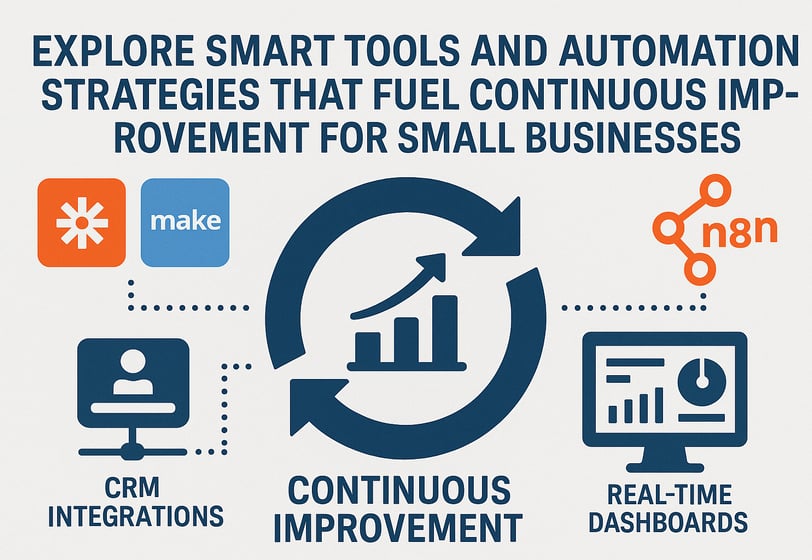Harnessing Smart Tools for Continuous Improvement in Small Businesses
Carlos Gazca
5/14/20252 min read


Introduction to Automation in Small Business
In today’s competitive landscape, small businesses are continuously seeking innovative ways to improve their operations and enhance productivity. Automation has emerged as a powerful tool that helps entrepreneurs streamline workflows, eliminate manual tasks, and scale operations efficiently. By leveraging smart tools and automation strategies, small business owners can not only save time but also drive continuous improvement across their organizations.
Platforms to Consider: Zapier, Make.com, and n8n
Numerous platforms exist to facilitate the automation process, with Zapier, Make.com, and n8n standing out as excellent options for small businesses. These tools enable users to connect various applications and automate tasks without the need for extensive programming knowledge. For instance, Zapier allows users to set up seamless workflows known as 'Zaps,' which can connect apps and trigger actions automatically. Similarly, Make.com offers a user-friendly interface for crafting complex workflows while n8n provides an open-source alternative for those wanting greater control over their integration processes.
Maximizing Efficiency through CRM Integrations and Feedback Loops
Integrating Customer Relationship Management (CRM) systems with these automation platforms adds a significant layer of efficiency. By doing so, businesses can automate data entry, manage customer interactions, and obtain valuable insights into their customer base. Moreover, establishing feedback loops is essential for growth and continuous improvement. These loops enable small businesses to collect customer feedback regularly and make iterative adjustments based on real-time data. The combination of CRM integrations and feedback loops not only enhances customer satisfaction but also promotes a culture of adaptability within the organization.
Real-Time Dashboards: A Window to Your Business Performance
Another crucial aspect of utilizing smart tools is the creation of real-time dashboards. These dashboards synthesize data from various sources, providing entrepreneurs with an instant overview of their business performance metrics. By utilizing platforms that offer customizable dashboard capabilities, small businesses can visualize trends, monitor KPIs, and make informed decisions swiftly. This enhanced visibility facilitates proactive responses to emerging challenges and opportunities, thus fostering a more resilient and decisive business environment.
Conclusion: Commit to Working Smarter
In conclusion, small businesses can significantly benefit from embracing smart tools and automation strategies that fuel continuous improvement. By implementing platforms such as Zapier, Make.com, and n8n, and integrating CRM systems alongside effective feedback loops and real-time dashboards, entrepreneurs can streamline operations and focus on strategic growth. As the business landscape continues to evolve, those committed to working smarter, not harder, will likely find themselves one step ahead in their journey towards sustainable success.